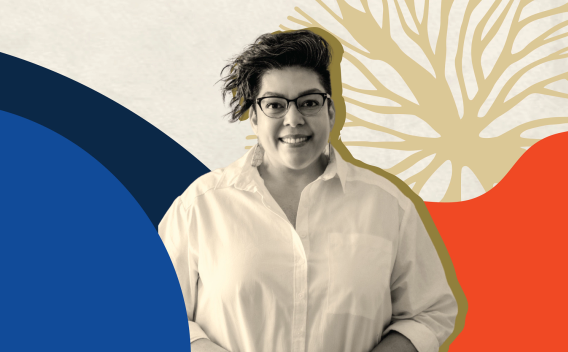By
Published
October 26, 2021
Tags
Content Warning: The interview below discusses the subject of domestic violence.
Domestic violence affects one in four women in the United States—and Jewish communities are not immune. The question is not whether domestic violence is a problem in the Jewish community, but rather: how do we stop and prevent it?
That is the challenge being tackled by Jewish Women International (JWI), a grantee in Schusterman Family Philanthropies’ U.S. Jewish portfolio. For decades, JWI has pioneered efforts to raise awareness of and address domestic violence in Jewish communities, such as by providing training and resources for Jewish community professionals, hosting the only annual conference focused on domestic violence in Jewish households, advocating for national legislation to address gender-based violence, and more. Last spring, JWI released Domestic Violence in the Jewish Community, a groundbreaking report that found U.S. Jewish communities substantially lack safe shelter, legal services, acknowledgment and support—and provided six recommendations for taking action.
Below, read our conversation with Deborah Rosenbloom, Chief Program Officer at JWI, to learn more about how her organization is working to protect and empower women of all faiths, the unique challenges Jewish communities face in addressing domestic violence and JWI’s latest strategies for supporting survivors and tackling violence head-on.

Deborah Rosenbloom, Chief Program Officer at JWI (Photo: Courtesy of JWI)
How common is domestic violence among Jewish families?
Domestic violence affects one in four women in the United States. While we do not have exact statistics on the prevalence of domestic violence experienced by Jewish families, but we do know that domestic violence programs serving the Jewish community are busy and overworked meeting the needs of Jewish survivors. And these programs are not even seeing the full extent of Jewish survivors, as many choose to get support from private therapists, attorneys and personal networks.
Additionally, the feelings of shame and family pressures often make Jewish survivors reluctant to seek help at all. This is especially true when children are still young and living at home, as custody battles are often long, drawn-out processes that too often give the abuser custody over the children.
Is there a qualitative difference in the way domestic violence occurs among Jews versus other communities?
First, we believe that the presence of stigma allows domestic violence to perpetuate in Jewish communities. What happens all too often is that Jewish communities prioritize the “macher,” the more powerful family member, at the expense of the survivor. Too often, we see the abuser as an important donor or member of the community and then the survivor is shunned; their children are shunned; they don’t feel there is a place for them. We need to work to shift this culture.
Second, while we can’t measure this in statistics, anecdotally, we have a sense that financial abuse is a major challenge for Jewish survivors. While physical violence and sexual violence are also prevalent, our team has seen that financial abuse is particularly present in Jewish communities.
What is financial abuse?
Financial abuse often manifests as an abuser—usually a man—withholding resources from the partner. This makes the victim—usually a woman—financially dependent with limited mobility.
We’ve talked to many women who appear affluent but told us their husbands intentionally prohibit their access to money and resources, “I don’t have access to the credit card; I am given enough money to pay for groceries and have to show receipts to my husband; my husband withholds money from me unless I perform sexual acts that I do not want to do; my husband will not give me the passwords to our accounts…” We’ve heard of abusers purposefully preventing the victim from getting to work – puncturing car tires, depleting the gas tank and stalking her at work. We’ve heard of abusers saying, “If you love me, you’ll make me pancakes for breakfast,” even though their partner is already late for work. All of this takes away access to financial independence, making it difficult to leave the relationship and easier for more abuse to happen.
What are some key findings from JWI’s recent report?
At a high level, our report found that although there is available support for survivors’ short-term needs, such as emergency housing, counseling, and restraining orders, we need far more long-term solutions to help survivors lead safe and healthy lives. As a starting point, we identify six necessary long-term solutions for addressing domestic violence in Jewish communities:
- Expand virtual support offerings.
- Provide training for community leaders, including clergy and staff at Jewish Community Centers (JCCs), on how to acknowledge and respond to domestic abuse.
- Increase access to affordable and knowledgeable legal services.
- Help survivors reclaim financial independence and self-sufficiency through income and other financial resources.
- Establish more transitional and affordable housing.
- Provide training for youth organizations, including camps, schools, and athletic teams, on how to understand and support children who witness domestic violence.
To get a full picture of the key challenges facing survivors and recommendations for how to increase long-term survivor support, read our full report.
How is JWI responding to the needs revealed by the report?
We are responding in many ways. Just this week, we announced the establishment of a new National Center on Domestic Violence in the Jewish Community, which will be a hub for programs and initiatives that support the field and promote advancements, including policy development, training, education, community collaboration and much more.
We also have a new partnership with the JCC Association of North America. We’ll be training early childhood educators, camp staff and security personnel so that everyone feels prepared to navigate interactions with abusers and help survivors. This is the first program of its kind. We’ll start our partnership with five Jewish community centers (JCCs) and hope to expand to 100 in three years.
Why is partnering with Jewish Community Centers (JCCs) an important tactic?
Local JCCs are often the hubs of Jewish communities, so they are ideal spaces to address our communities’ most pressing challenges—including domestic violence. We want people at JCCs to recognize the impact on children witnessing the violence so they can recognize why children may act out in response, and we also hope they can help these children become more resilient.
There are also more technical issues that we can address with directors of JCC programs. These range from providing resources for supporting community members with restraining orders to finding solutions when an abuser wants to pick up their child from childcare. We’ve heard from JCC directors that they have been flying by the seat of their pants, with no preparation to deal with these challenges.
What strategies is JWI hoping to implement in the future?
There are many strategies we are excited about, and three come to mind at the moment. First, we plan to explore partnerships with businesses such as Airbnb, to help meet survivors’ access to housing, and Lyft, to help with moving needs.
Second, we intend to help domestic violence programs increase funding so they can ensure there is at least one trauma-informed attorney with expertise in family law on staff.
Finally, we hope to explore new ways to help survivors rebuild their economic security. This includes developing a national training program focused on their strengths and skills that can lead to employment and encouraging financial institutions to provide support through methods such as low-interest loans.





